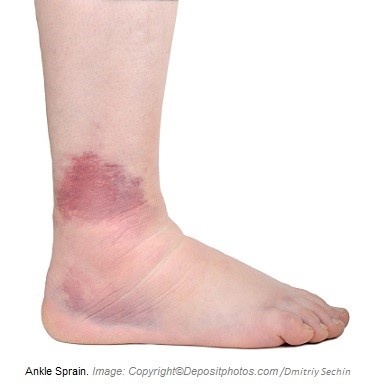
Strains and sprains are very common in sports and routine daily activities. They are minor
injuries and tears in the soft tissues. Strain refers to an injury to a tendon or a muscle, and sprain refers to an injury to a ligament. Strain is known among public and gym goers as “pulled muscle”.
Strains and sprains are classified as first degree (mild or minimal), second degree (moderate), or third degree (severe or complete). The most common type of sprain is the ankle sprain, which is sometimes called ankle torsion. It is characterized by pain, swelling, bruise, tenderness, difficulty walking, and joint instability in severe cases.
Potential risk factors:
- Muscle fatigue.
- Improper warm-up.
- Poor conditioning.
- Muscle imbalance.
- Inappropriate positioning.
- Twisting and weight bearing at the same time.
- Abnormal anatomical structures.
- Oxidative stress.
- Burnout or overtraining syndrome.
Nutritional Supports:
Restricted Foods:
- Sweets and sugar. They slow down healing process.
- Junk foods.
- Processed foods.
- Foods high in saturated fat. They lessen blood circulation to the area.
- Too much salt.
- Foods high in Omega-6 fatty acid: soy, sunflower oil, safflower oil, corn oil, borage oil, sesame oil, and evening primrose oil. Omega-6, particularly Alpha-Lioleic Acid, is a pro-inflammatory.
- Foods high in solanine: potatoes, tomatoes, eggplants, and peppers. Solanine is a poisonous plant alkaloid produced by the plants from nightshade family as a natural defense mechanism against external microorganisms. Solanine exacerbates inflammation and delays recovery from sports injuries.
Recommended Foods:
- Drinking of plenty of water: 2 – 3 liters a day.
- Whole grains.
- Legumes.
- Fresh fruits and vegetables.
- Fruits high in flavonoids: berries, and red grapes.
- Foods high in Omega-3 fatty acids: fish, flaxseeds, chia, hemp seeds, and walnuts.
- Pineapple. It contains bromelain that reduces inflammation.
- Spices high in antioxidants: sumac, turmeric, and cinnamon.
Recommended Supplements:
- French Maritime Pine Bark Extract: 200 – 300 mg a day. It is a collagen and fibrin stabilizer, improves blood circulation, and decreases inflammation. Collagen and fibrin are the key proteins in ligaments and tendons.
- Grape Seed Extract: 100 – 200 mg a day.
- Bromelain: 1500 mg a day. It is a potent anti-inflammatory agent.
- Vitamin C: 2 – 3 grams a day.
- Digestive Enzymes: A full spectrum product.
- Boswellia Extract: 1200 mg a day. It improves blood supply to the tissues and reduces inflammation as well.
- White Willow Bark: 400 – 800 mg a day. It contains salicin that reduces pain and inflammation.
- Omega – 3 Fatty Acids: 2 – 3 grams a day. They reduce inflammation.
- Curcumin: 1000 – 1500 mg a day.
- Chondroitin Sulfate: 1200 – 1800 mg a day.
- Arnica Oil: apply 2 to 3 times a day to the affected area. It reduces pain, soreness, bruise and swelling.
Miscellaneous Suggestions:
- RICE (Rest, Ice, Compression, Elevation).
- Stretches after subsiding the acute phase.

